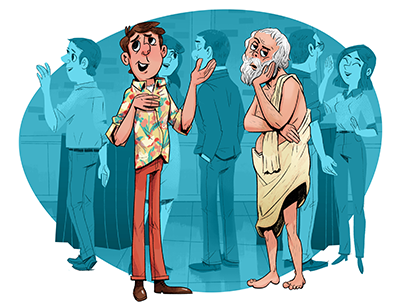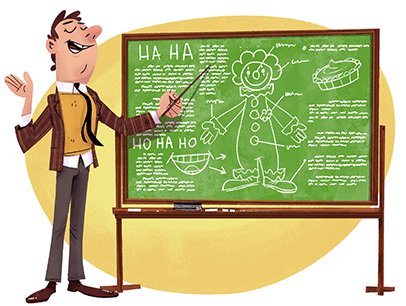 Illustration by Bart Browne
Illustration by Bart BrowneAs someone eager to excel at public speaking, you have no doubt been told to “grab” the audience’s attention right from the start. This is true, although “grab” seems a bit harsh. It makes you sound like a thief: This is a speech! Give me your attention and nobody gets hurt!
You must understand—an audience is like a hungry animal waiting to be fed a tasty, nutritious, intellectual meal. And animals always sniff their food before they eat to make sure it’s to their taste. Well, your introduction is the sniff, that critical moment when your listeners’ psychic olfactory nerves sense whether they’re in for a nice, big, juicy bone or a bowl of mush.
There are many ways to pique curiosity. You could, for instance, walk onstage in a suit of armor. Rapt attention is guaranteed. You must also get off the stage in a suit of armor, which, if not negotiated successfully, will cause you to be remembered not for the brilliance of your words but for the sound of empty tin cans in the spin cycle of a washing machine.
We will not risk such low-percentage stratagems. We will go straight to the road-tested, time-proven device that has been used ever since our pre-verbal ancestors scratched pictures of wooly mammoths and odd-toed ungulates on cave walls—storytelling. Stories connect people. They are both universal and personal—as long as they aren’t too personal. Everyone can relate to your fear of ill health. No one wants to hear how you get wax out of your ears.
Storytelling sounds easy. All you have to do is begin with, “You know, a funny thing happened to me yesterday …” and you’ve got them, right? Not exactly. Extensive research shows that the odds of your “funny thing” actually being funny to a real, live audience are roughly 736 trillion to one. Any takers? If not, then let’s just stop pretending we’re all natural-born storytellers and go to one who is: Craig Valentine, the 1999 Toastmasters World Champion of Public Speaking. Valentine’s resume as a storytelling motivational speaker qualifies him for the Most Incredible Person in the Universe Award, so we’ll skip the specifics and get right to some suggestions from his website, along with a little amplification from yours truly.
Let the story breathe and the drama rise. Don’t file your nails in the meantime.
Start in the middle. “As I began my journey to Alaska …” is a fine beginning but not nearly as compelling as, “There I was, facing a pack of wolves with nothing but a jar of peanut butter and a plastic picnic knife.” Your listeners will definitely want to know how you got there—and why you’re not dead.
Invite your audience into the scene. Make them part of the story. In the example above, you could perhaps have them throwing snowballs at the circling carnivores.
Have a foundational phrase. Offer a short phrase your audience can remember and repeat. For instance, your Alaskan adventure might be summed up neatly with: The wilderness is great if you don’t get ate.
Take time between lines. Let the story breathe and the drama rise. Don’t file your nails in the meantime.
Use dialogue. Become a character in the story. Speak as they would. Make sure it’s not someone who uses obscene language.
Show emotional change. A good story shows your hero’s growth. If he or she ends up crying, don’t act it out. Fake crying will clear a room faster than the cymbals section of a high school marching band.
Escalate the conflict. Good stories have conflict. Keep building the tension until somebody falls off a cliff.
Employ your looks. Facial expressions greatly enhance storytelling, especially if it’s about someone sitting on a tack.
Keep it short. Attention ems are getting shorter. Everyone has a smartphone. One minute too long could be the difference between you and online solitaire.
Put these tips together and you have one heck of a speech: Imagine yourself standing beside me (involve listeners), facing hungry wolves after our picnic of peanut butter sandwiches (start in the middle) … and you quip, “The wilderness is great if we don’t get ate” (foundational phrase), which makes me smile (facial expression) and think (pause for effect), and suddenly I change from a terrified tourist to a brave warrior (hero’s growth) who actually attacks the wolves (escalate conflict) and drives them off with a plastic picnic knife. Thank you very much. (Keep it short.)
So, thank you, Mr. Valentine. If we ever meet, I’ll tell you about a funny thing that happened …
John Cadley is a former advertising copywriter, freelance writer, and musician living in Fayetteville, New York. Learn more at www.cadleys.com.



 Previous
Previous

 Previous Article
Previous Article

